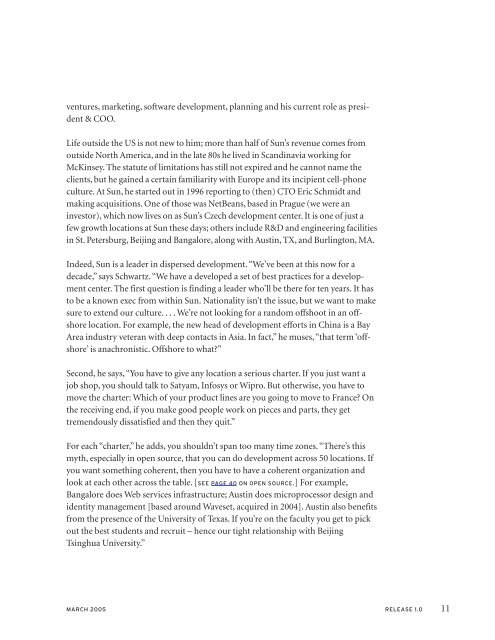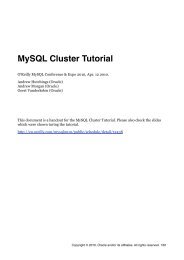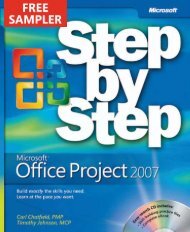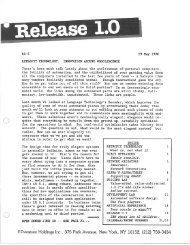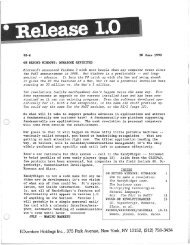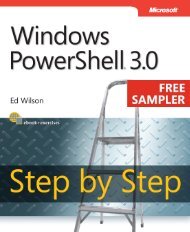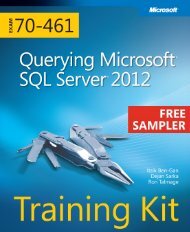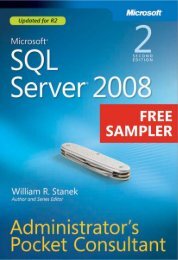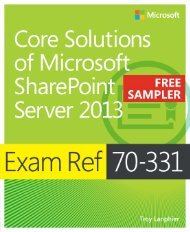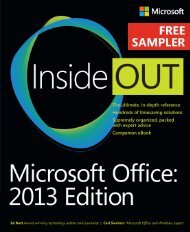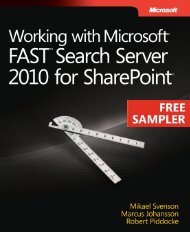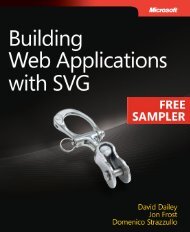The World Wide World: IT Ain't Just the Web ... - Cdn.oreilly.com
The World Wide World: IT Ain't Just the Web ... - Cdn.oreilly.com
The World Wide World: IT Ain't Just the Web ... - Cdn.oreilly.com
You also want an ePaper? Increase the reach of your titles
YUMPU automatically turns print PDFs into web optimized ePapers that Google loves.
ventures, marketing, software development, planning and his current role as president<br />
& COO.<br />
Life outside <strong>the</strong> US is not new to him; more than half of Sun’s revenue <strong>com</strong>es from<br />
outside North America, and in <strong>the</strong> late 80s he lived in Scandinavia working for<br />
McKinsey. <strong>The</strong> statute of limitations has still not expired and he cannot name <strong>the</strong><br />
clients, but he gained a certain familiarity with Europe and its incipient cell-phone<br />
culture. At Sun, he started out in 1996 reporting to (<strong>the</strong>n) CTO Eric Schmidt and<br />
making acquisitions. One of those was NetBeans, based in Prague (we were an<br />
investor), which now lives on as Sun’s Czech development center. It is one of just a<br />
few growth locations at Sun <strong>the</strong>se days; o<strong>the</strong>rs include R&D and engineering facilities<br />
in St. Petersburg, Beijing and Bangalore, along with Austin, TX, and Burlington, MA.<br />
Indeed, Sun is a leader in dispersed development. “We’ve been at this now for a<br />
decade,” says Schwartz. “We have a developed a set of best practices for a development<br />
center. <strong>The</strong> first question is finding a leader who’ll be <strong>the</strong>re for ten years. It has<br />
to be a known exec from within Sun. Nationality isn’t <strong>the</strong> issue, but we want to make<br />
sure to extend our culture....We’re not looking for a random offshoot in an offshore<br />
location. For example, <strong>the</strong> new head of development efforts in China is a Bay<br />
Area industry veteran with deep contacts in Asia. In fact,” he muses, “that term ‘offshore’<br />
is anachronistic. Offshore to what?”<br />
Second, he says, “You have to give any location a serious charter. If you just want a<br />
job shop, you should talk to Satyam, Infosys or Wipro. But o<strong>the</strong>rwise, you have to<br />
move <strong>the</strong> charter: Which of your product lines are you going to move to France? On<br />
<strong>the</strong> receiving end, if you make good people work on pieces and parts, <strong>the</strong>y get<br />
tremendously dissatisfied and <strong>the</strong>n <strong>the</strong>y quit.”<br />
For each “charter,” he adds, you shouldn’t span too many time zones. “<strong>The</strong>re’s this<br />
myth, especially in open source, that you can do development across 50 locations. If<br />
you want something coherent, <strong>the</strong>n you have to have a coherent organization and<br />
look at each o<strong>the</strong>r across <strong>the</strong> table. [SEE PAGE 40 ON OPEN SOURCE.] For example,<br />
Bangalore does <strong>Web</strong> services infrastructure; Austin does microprocessor design and<br />
identity management [based around Waveset, acquired in 2004]. Austin also benefits<br />
from <strong>the</strong> presence of <strong>the</strong> University of Texas. If you’re on <strong>the</strong> faculty you get to pick<br />
out <strong>the</strong> best students and recruit – hence our tight relationship with Beijing<br />
Tsinghua University.”<br />
MARCH 2005 RELEASE 1.0 11


